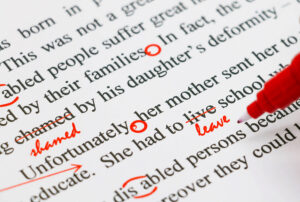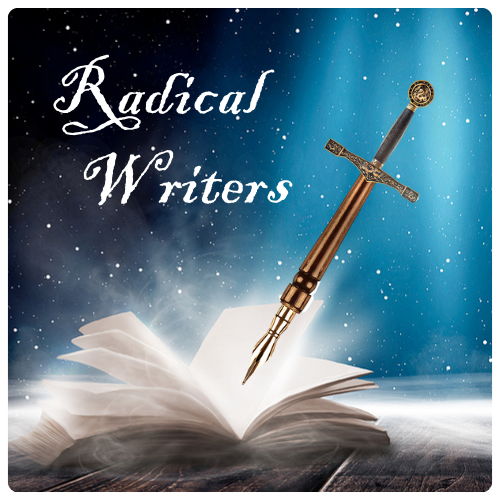
Editing costs vary depending on the type of edit and the editor’s personal rates. Unfortunately, many writers hear, “Get a professional edit.” But unless you know what type of edit you need, you may pay extra or not contract for the best edit for your work. In response to that question, keep reading so you can understand not only the potential editing cost, but also the various edits available.
Disclaimer: Individual editors set prices and may use different terminology. While the given ranges in this post apply to November 2023, rates may change. Be sure to verify with a professional editor what a specific edit includes and what he or she charges.
Editing Cost by Type
Editorial Assessment: Also known as a manuscript evaluation, the assessment provides an overall review of your work and often comes with a recommendation for further editing. This edit can equip you with overall improvements but doesn’t provide specifics beyond a few examples.
Expectations:
- High-level suggestions for improvement
- Editor’s Overall Opinion
- Strengths & weaknesses
- In plot
- Characters
- Dialog
- Structure
- other
- Summary without rewrites or correction
- $46-$70/hour or $.03-$.07/word
Book Doctoring: Some editors may use the term developmental for this type of edit. If you have a well-written manuscript, or you’re willing to learn and improve, you won’t need anything this deep. Book doctoring works best for those who have a story but don’t write well. A sub-service of ghostwriting, book doctoring enhances and develops a manuscript on behalf of an author.
Expectations:
- Developmental editing tasks
- Rewrite and/or restructure passages from the manuscript
- Similar to ghostwriting, but enhances the author’s work rather than writing from scratch
- $61-70/hour or $.06-$.07/word
Content/Development/Substantive: Many manuscripts need this level of editing which encompasses overall improvement. This level of editing considers a work’s organization and presentation. It involves tightening and clarifying at a chapter, scene, paragraph, and sentence level. It may include grammar and style, although the editor won’t focus on these elements as much. From an editor’s perspective, self-edit your grammar so the one you hire can better focus on content.
Since many editors consider development an offshoot of ghostwriting, adding content where needed or rounding out a skeleton manuscript, be sure to clarify what an editor means by “development.” If an editor says you need a development edit, be sure to clarify his or her meaning.
Expectations:
- Summary—similar to assessment
- Specific suggestions but doesn’t rewrite passages
- May recommend reorganizing
- Proposes solutions
- Some line or copy edits to teach changes to the author
- $46-$70/hour or $.03-$.07/word
Line Edits: This refers to a unique edit that falls between copyediting and developmental editing in intensity. In line editing, the editor looks at your book line by line or at the paragraph level and analyzes each sentence, considering word choice and the power and meaning of a sentence. The editor considers syntax and whether a sentence needs tightening. Line editing helps makes your prose sing.
The highest level of editing, except for book doctoring, line editing also costs the most.
Expectations:
- Corrections of errors
- Focus on language and style
- Not intent on catching every grammar or spelling error
- $46-50/hour or $.04 to $.05/word
Copy Editing: This broad and deep edit reviews all aspects of the manuscript, including but not limited to grammar and style. Less deep than content, development, or line editing, this common level catches many mistakes an author misses. Most editors offer something between a proofread and content at this level. This may also include verification of biblical references, but be sure and confirm if you need it, as this may incur an extra cost.
Expectations:
- Correct spelling, grammar, usage and punctuation
- Check cross-references
- Perfect wording and overall flow
- Consistency and accuracy across the manuscript, plus overall final review
- $36-50/hour or $.02-$.05/word
Proofreading: The last step of editing before going to publication, this edit looks for common errors, spelling, grammatical mistakes, etc. The best proofread happens after formatting and before final publication. That way, your proofreader can also assess the layout. Many times, editors receive a manuscript for proofreading prior to formatting. In that case, they may still look at headers and footers, chapter title style, etc.
A last check for typos and other errors, every completed manuscript needs this edit. While an author may opt to take on this editing role, it never hurts to have a second pair of eyes. An author often completes this edit (alone or with beta readers) from a digital or print proof copy.
Expectations:
- Check for spelling and typographical errors
- Check style for chapter titles
- Check headers, footers, flow, etc.
- Check overall look of manuscript, flow for print and/or e-book
$31-$45/hour or $.02-$.05
Last thoughts of the editing phase of a book. Some editors combine types and price the project accordingly. Be sure to understand what an editor provides when hiring one. Editors are human, and the best ones may miss something. Even a proofread can leave a mistake. As the author, you have the final responsibility for checking a proof copy of your book—regardless of the publishing route you choose. Expect to find one or more errors in a printed proof copy—and marvel if you don’t.
Are Editing Costs Worth It?
Not an insignificant amount of money, the editing cost can dissuade many writers. However, we write close to our projects and need an objective eye. While critique groups and modern software can help authors improve, a professional editor can take your writing from good to great or from great to phenomenal. They offer insights a computer-generated review won’t. Personal experience helps an editor offer more than grammar, style, spell-checks, punctuation, and all those things.
But is it worth the cost? Yes. You should always walk away from a professional edit with improvements. If you can’t afford the editing cost, consider ways to work with an editor. When approaching an editor, be honest with finances and what you can afford. Not all will accept payments over time, but some do. You might also consider the ideas below.
- Barter. If you have skills to help an editor, he or she may provide an edit in exchange for your assistance in other areas.
- Request a deep assessment of your work or a critique of a specified number of pages. Take what the editor provides and apply it to your manuscript.
- Ask for an edit of the first 50 pages… or 100… or as many as you can afford. Generally, the way you write in the first pages continues for the book’s remainder. By paying for fewer pages, you receive feedback and can apply what you learned from a good edit.
While the editing cost may feel daunting, consider the cost of not paying for a professional edit. Readers don’t prefer books laden with errors, have a poor flow, or make little sense. And they won’t recommend poorly written books to others.
Finding an Editor
To find an editor, get references from other writers. You can also attend workshops and conferences. Visit legitimate websites, such as Editorial Freelance Association or The Christian PEN and others but be cautious. Just because someone says they’re an editor doesn’t mean they know anything about writing or the industry.
Don’t expect to fall next in line on an editor’s busy schedule. Patience, a fruit of the spirit, is a virtue. But be careful about praying for patience. The answer may involve events you don’t want to face.
Be sure to match your style with the editor. A western writer turned editor may not fit your story. One who edits only nonfiction may not fit your latest novel, and a fiction only editor may know nothing about nonfiction. Ask questions, request references or a sample edit, and seek discernment from Holy Spirit. He already knows exactly who He plans to work with you, so pray for direction. Sometimes, He may lead you to an editor who needs exactly what you wrote.
To improve your writing before submitting to an editor, join us at one of our writing groups. Your future editor will appreciate self-editing first.
